文字数が多く、重くなるのでページを分割しています。
各章は下のリンクまたはページ下の「次へ」をクリックしてください。
1章 方程式・式と証明
2章 図形と方程式
3章 三角関数
4章 指数関数・対数関数
5章 微分と積分
Readiness check
p.180
問1
\(y=-x-1\)
問1
\(y=-x-1\)
p.180
問2
\(k=5\)
問2
\(k=5\)
p.181
問3
\({\small (1)}~\)
\(x=1\) で最大値 \(4\)
\(x=-2\) で最小値 \(-5\)
\({\small (2)}~\)
\(x=1\) で最大値 \(5\)
\(x=-1\) で最小値 \(-3\)
問3
\({\small (1)}~\)
\(x=1\) で最大値 \(4\)
\(x=-2\) で最小値 \(-5\)
\({\small (2)}~\)
\(x=1\) で最大値 \(5\)
\(x=-1\) で最小値 \(-3\)
p.181
問4
\({\small (1)}~y=-{\large \frac{1}{4}}(x+3)^2-2\)
\({\small (2)}~y=-(x-3)^2+9\)
問4
\({\small (1)}~y=-{\large \frac{1}{4}}(x+3)^2-2\)
\({\small (2)}~y=-(x-3)^2+9\)
1節 微分係数と導関数
p.183
問1
\({\small (1)}~2\) \({\small (2)}~-12\)
問1
\({\small (1)}~2\) \({\small (2)}~-12\)
p.185
問4
\(-4\)
問4
\(-4\)
p.187
問5
$$~~~~~~f'(x)$$$$~=\lim_{h\to 0}{\frac{2(x+h)^2-2x^2}{h}}$$$$~=\lim_{h\to 0}{\frac{2x^2+4xh+2h^2-2x^2}{h}}$$$$~=\lim_{h\to 0}{\frac{4xh+2h^2}{h}}$$$$~=\lim_{h\to 0}(4x+2h)$$$$~=4x$$
→ 導関数
問5
$$~~~~~~f'(x)$$$$~=\lim_{h\to 0}{\frac{2(x+h)^2-2x^2}{h}}$$$$~=\lim_{h\to 0}{\frac{2x^2+4xh+2h^2-2x^2}{h}}$$$$~=\lim_{h\to 0}{\frac{4xh+2h^2}{h}}$$$$~=\lim_{h\to 0}(4x+2h)$$$$~=4x$$
→ 導関数
p.189
問6
\({\small (1)}~y’=2\)
\({\small (2)}~y’=2x+4\)
\({\small (3)}~y’=-6x^2-10x+7\)
\({\small (4)}~y’=x^2-x-3\)
問6
\({\small (1)}~y’=2\)
\({\small (2)}~y’=2x+4\)
\({\small (3)}~y’=-6x^2-10x+7\)
\({\small (4)}~y’=x^2-x-3\)
p.190
問7
\({\small (1)}~y’=-8x+3\)
\({\small (2)}~y’=4x-1\)
\({\small (3)}~y’=8x\)
\({\small (4)}~y’=3x^2+4x+1\)
問7
\({\small (1)}~y’=-8x+3\)
\({\small (2)}~y’=4x-1\)
\({\small (3)}~y’=8x\)
\({\small (4)}~y’=3x^2+4x+1\)
p.190
問8
\({\small (1)}~{\large \frac{dh}{dt}}=10-10t\)
\({\small (2)}~{\large \frac{dV}{dr}}=4\pi r^2\)
→ 微分の計算
問8
\({\small (1)}~{\large \frac{dh}{dt}}=10-10t\)
\({\small (2)}~{\large \frac{dV}{dr}}=4\pi r^2\)
→ 微分の計算
p.190
問9
\(1~,~5~,~-15\)
問9
\(1~,~5~,~-15\)
Training
p.192
1
\({\small (1)}~10-3h\)
\({\small (2)}~10\)
1
\({\small (1)}~10-3h\)
\({\small (2)}~10\)
p.192
2
$$~~~~~~f'(x)$$$$~=\lim_{h\to 0}{\small \frac{3(x+h)^2+2(x+h)-(3x^2+2x)}{h}}$$$$~=\lim_{h\to 0}{\small \frac{6xh+3h^2+2h}{h}}$$$$~=\lim_{h\to 0}(6x+3h+2)$$$$~=6x+2$$
2
$$~~~~~~f'(x)$$$$~=\lim_{h\to 0}{\small \frac{3(x+h)^2+2(x+h)-(3x^2+2x)}{h}}$$$$~=\lim_{h\to 0}{\small \frac{6xh+3h^2+2h}{h}}$$$$~=\lim_{h\to 0}(6x+3h+2)$$$$~=6x+2$$
p.192
3
\({\small (1)}~y’=4\)
\({\small (2)}~y’=-4x+3\)
\({\small (3)}~y’=3x^2+6x\)
\({\small (4)}~y’=-2x^2+3x-2\)
3
\({\small (1)}~y’=4\)
\({\small (2)}~y’=-4x+3\)
\({\small (3)}~y’=3x^2+6x\)
\({\small (4)}~y’=-2x^2+3x-2\)
p.192
4
\({\small (1)}~y’=12x^2+10x+18\)
\({\small (2)}~y’=24x^2+72x+54\)
4
\({\small (1)}~y’=12x^2+10x+18\)
\({\small (2)}~y’=24x^2+72x+54\)
p.192
5
\({\small (1)}~f'(x)=2x+2~,~f'(-2)=-2\)
\({\small (2)}~f'(x)=-3x^2+3~,~f’\left({\large \frac{1}{2}}\right)={\large \frac{9}{4}}\)
5
\({\small (1)}~f'(x)=2x+2~,~f'(-2)=-2\)
\({\small (2)}~f'(x)=-3x^2+3~,~f’\left({\large \frac{1}{2}}\right)={\large \frac{9}{4}}\)
p.192
7
\({\small (1)}~\)[証明] \(y=a^2x^2+2abx+b^2\) より、微分すると、
\(y’=2a^2x+2ab=2a(ax+b)\)
したがって、
\(y=(ax+b)^2\) ならば \(y’=2a(ax+b)\) [終]
\({\small (2)}~\)[証明]
\(y=a^3x^3+3a^2bx^2+3ab^2x+b^3\) より、微分すると、
\(y’=3a^3x^2+6a^2bx+3a^2\)
\(~~=3a(a^2x^2+2abx+b^2)\)
\(~~=3a(ax+b)^2\)
したがって、
\(y=(ax+b)^3\) ならば \(y’=3a(ax+b)^2\) [終]
7
\({\small (1)}~\)[証明] \(y=a^2x^2+2abx+b^2\) より、微分すると、
\(y’=2a^2x+2ab=2a(ax+b)\)
したがって、
\(y=(ax+b)^2\) ならば \(y’=2a(ax+b)\) [終]
\({\small (2)}~\)[証明]
\(y=a^3x^3+3a^2bx^2+3ab^2x+b^3\) より、微分すると、
\(y’=3a^3x^2+6a^2bx+3a^2\)
\(~~=3a(a^2x^2+2abx+b^2)\)
\(~~=3a(ax+b)^2\)
したがって、
\(y=(ax+b)^3\) ならば \(y’=3a(ax+b)^2\) [終]
2節 導関数の応用
p.196
問3
\({\small (1)}~\)
\(x≦3\) で減少
\(x≧3\) で増加
\({\small (2)}~\)
\(x≦1\) で増加
\(1≦x≦3\) で減少
\(x≧3\) で増加
問3
\({\small (1)}~\)
\(x≦3\) で減少
\(x≧3\) で増加
\({\small (2)}~\)
\(x≦1\) で増加
\(1≦x≦3\) で減少
\(x≧3\) で増加
p.198
問4
\({\small (1)}~\)
\(x=-1\) で極大値 \(5\)
\(x=1\) で極小値 \(-3\)

\({\small (2)}~\)
\(x=1\) で極大値 \(10\)
\(x=-3\) で極小値 \(-22\)

→ 3次関数のグラフと増減表
問4
\({\small (1)}~\)
\(x=-1\) で極大値 \(5\)
\(x=1\) で極小値 \(-3\)
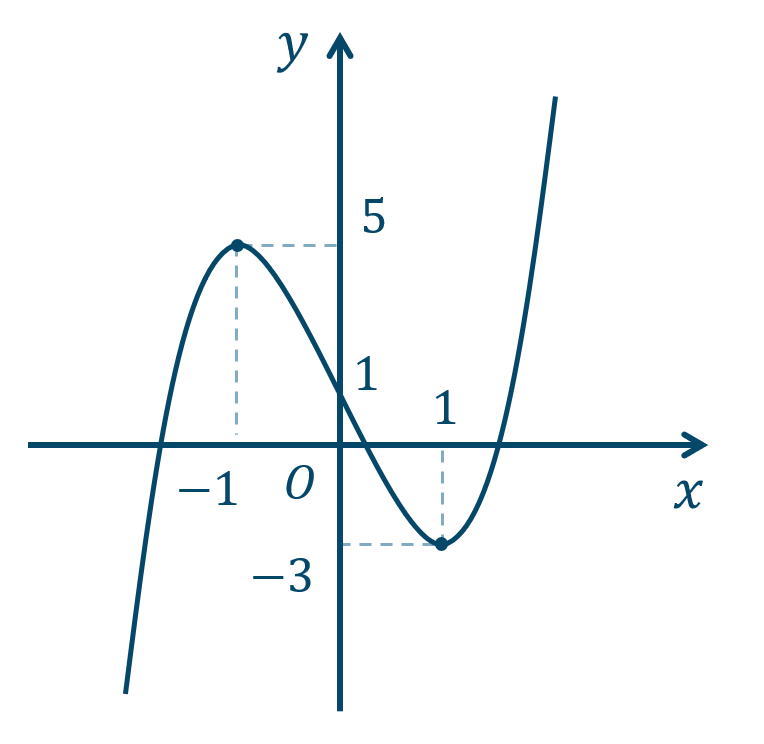
\({\small (2)}~\)
\(x=1\) で極大値 \(10\)
\(x=-3\) で極小値 \(-22\)
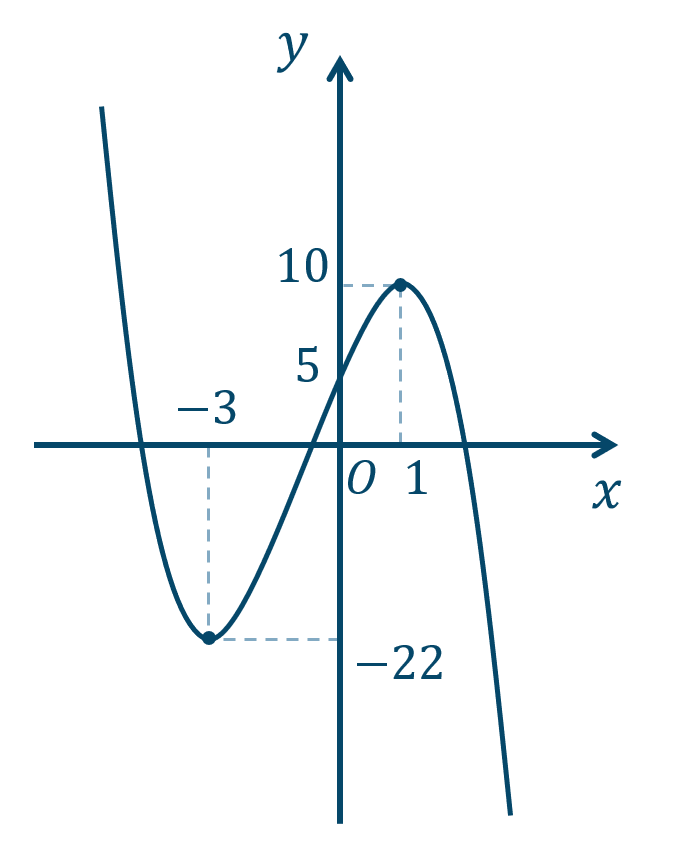
→ 3次関数のグラフと増減表
p.198
問5
\({\small (1)}~\)極値をもたない
\({\small (2)}~\)極値をもたない
問5
\({\small (1)}~\)極値をもたない
\({\small (2)}~\)極値をもたない
p.200
問1
Challenge
\({\small (1)}~\)

\({\small (2)}~\)

\({\small (3)}~\)

\({\small (4)}~\)

→ 4次関数のグラフと増減表
問1
Challenge
\({\small (1)}~\)
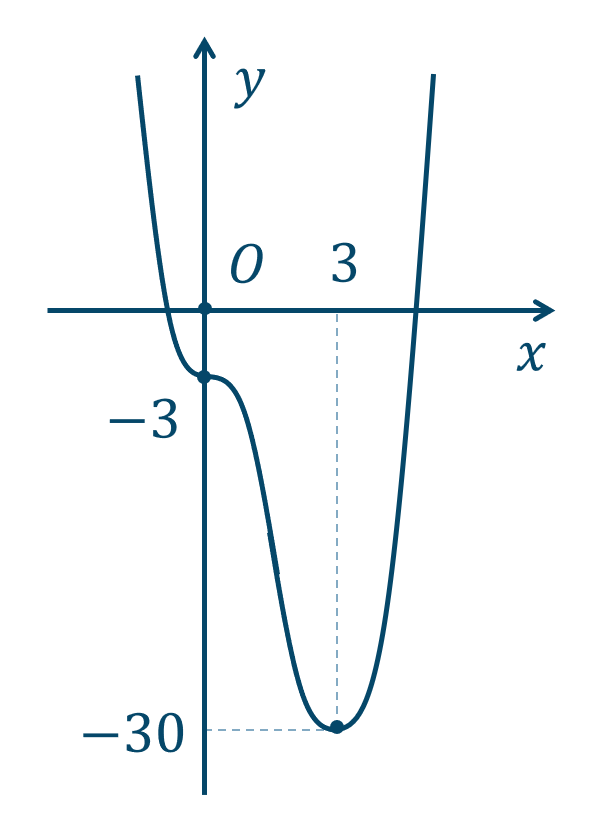
\({\small (2)}~\)
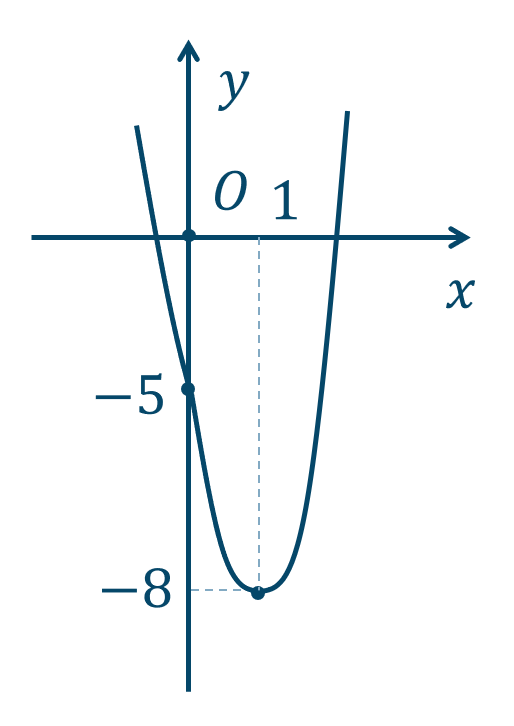
\({\small (3)}~\)
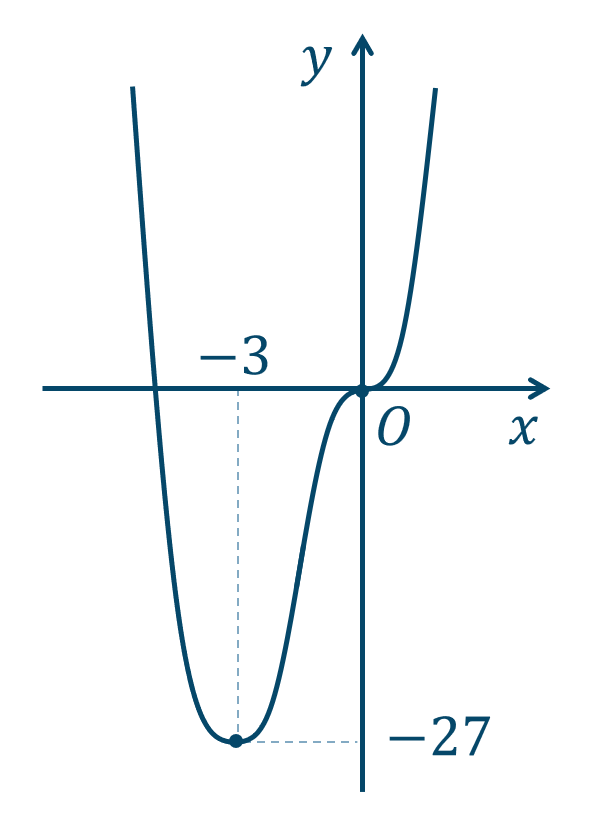
\({\small (4)}~\)
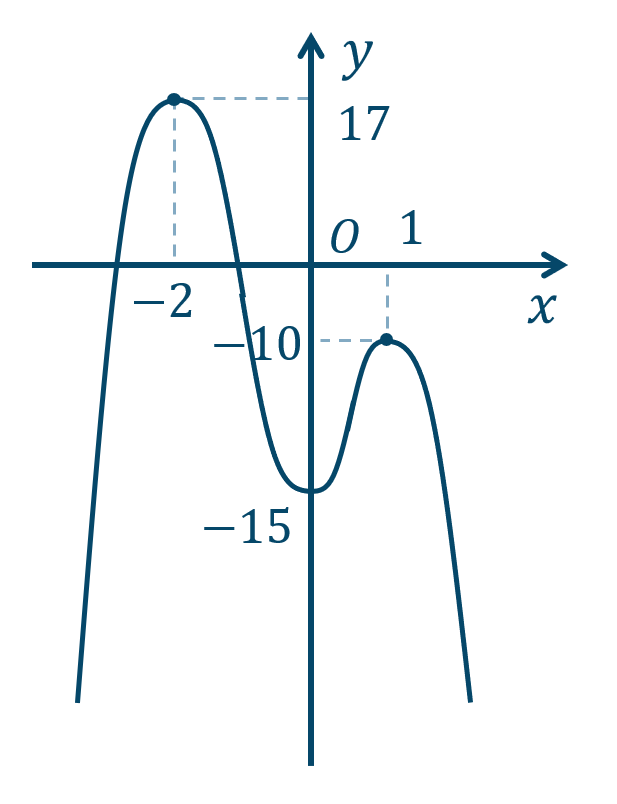
→ 4次関数のグラフと増減表
p.201
問7
\({\small (1)}~\)
\(x=2\) で最大値 \(12\)
\(x=-2\) で最小値 \(-4\)
\({\small (2)}~\)
\(x=-2\) で最大値 \(43\)
\(x=-{\large \frac{1}{2}}\) で最小値 \(-{\large \frac{17}{4}}\)
→ 3次関数の最大値・最小値
問7
\({\small (1)}~\)
\(x=2\) で最大値 \(12\)
\(x=-2\) で最小値 \(-4\)
\({\small (2)}~\)
\(x=-2\) で最大値 \(43\)
\(x=-{\large \frac{1}{2}}\) で最小値 \(-{\large \frac{17}{4}}\)
→ 3次関数の最大値・最小値
p.202
問8
\(x=3\sqrt{3}\)
問8
\(x=3\sqrt{3}\)
p.205
問10
[証明]
\(f(x)=(x^3+16)-12x\) とすると、
\(f'(x)=3x^2-12=3(x+2)(x-2)\)
よって、\(x≧0\) での増減表は
問10
[証明]
\(f(x)=(x^3+16)-12x\) とすると、
\(f'(x)=3x^2-12=3(x+2)(x-2)\)
よって、\(x≧0\) での増減表は
| \(x\) | \(0\) | \(\cdots\) | \(2\) | \(\cdots\) |
| \(f'(x)\) | \(-\) | \(0\) | \(+\) | |
| \(f(x)\) | \(16\) | ↘ | \(0\) | ↗ |
よって、\(x≧0\) で最小値が \(0\) であるので、
\(f(x)≧0\)
したがって、\(x≧0\) のとき
\(x^3+16≧12x\)
また、等号が成り立つときは \(x=2\) のとき [終]
→ 3次不等式の証明
Training
p.206
8
\(y=2x+3\)
8
\(y=2x+3\)
p.206
9
\(y=-x-1~,~y=7x-25\)
9
\(y=-x-1~,~y=7x-25\)
p.206
10
\({\small (1)}~\)
\(x≦-2\) で減少
\(-2≦x≦2\) で増加
\(x≧2\) で減少
\({\small (2)}~\)
\(x≦-1\) で増加
\(-1≦x≦2\) で減少
\(x≧2\) で増加
10
\({\small (1)}~\)
\(x≦-2\) で減少
\(-2≦x≦2\) で増加
\(x≧2\) で減少
\({\small (2)}~\)
\(x≦-1\) で増加
\(-1≦x≦2\) で減少
\(x≧2\) で増加
p.206
11
\({\small (1)}~\)
\(x=0\) で極大値 \(0\)
\(x=1\) で極小値 \(-1\)

\({\small (2)}~\)
\(x={\large \frac{1}{3}}\) で極大値 \({\large \frac{28}{27}}\)
\(x=0\) で極小値 \(1\)

11
\({\small (1)}~\)
\(x=0\) で極大値 \(0\)
\(x=1\) で極小値 \(-1\)
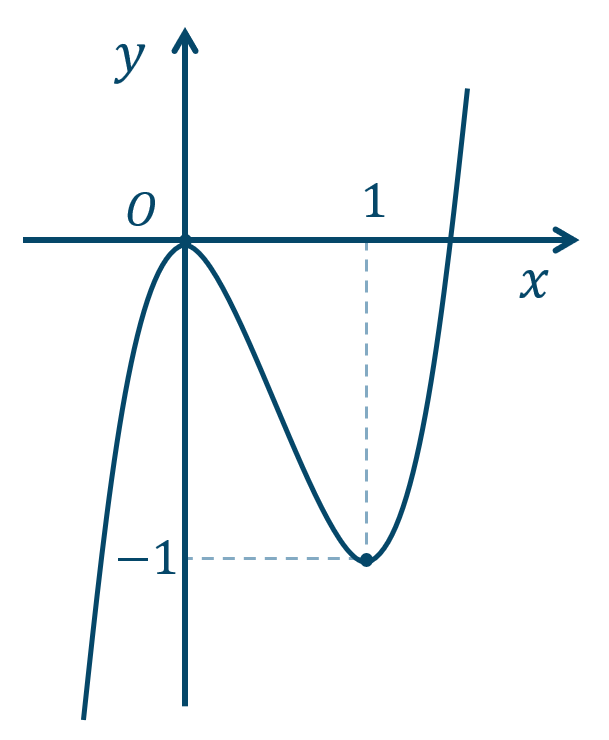
\({\small (2)}~\)
\(x={\large \frac{1}{3}}\) で極大値 \({\large \frac{28}{27}}\)
\(x=0\) で極小値 \(1\)
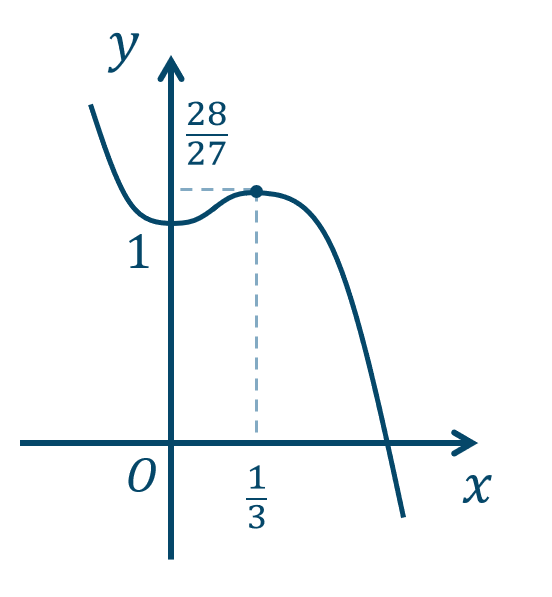
p.206
12
\(a=3~,~b=-2\)
\(x=0\) で極小値 \(-2\)
12
\(a=3~,~b=-2\)
\(x=0\) で極小値 \(-2\)
p.206
13
\({\small (1)}~\)
\(x=4\) で最大値 \(36\)
\(x=-1~,~2\) で最小値 \(16\)
\({\small (2)}~\)
\(x=0\) で最大値 \(1\)
\(x=3\) で最小値 \(-8\)
13
\({\small (1)}~\)
\(x=4\) で最大値 \(36\)
\(x=-1~,~2\) で最小値 \(16\)
\({\small (2)}~\)
\(x=0\) で最大値 \(1\)
\(x=3\) で最小値 \(-8\)
p.206
14
\(x=4\)
14
\(x=4\)
p.206
15
\({\small (1)}~\)1個 \({\small (2)}~\)2個 \({\small (3)}~\)3個
15
\({\small (1)}~\)1個 \({\small (2)}~\)2個 \({\small (3)}~\)3個
p.206
16
[証明]
\(f(x)=(2x^3+27)-9x^2\) とすると、
\(f'(x)=6x^2-18x=6x(x-3)\)
よって、\(x≧0\) での増減表は
16
[証明]
\(f(x)=(2x^3+27)-9x^2\) とすると、
\(f'(x)=6x^2-18x=6x(x-3)\)
よって、\(x≧0\) での増減表は
| \(x\) | \(0\) | \(\cdots\) | \(3\) | \(\cdots\) |
| \(f'(x)\) | \(-\) | \(0\) | \(+\) | |
| \(f(x)\) | \(27\) | ↘ | \(0\) | ↗ |
よって、\(x≧0\) で最小値が \(0\) であるので、
\(f(x)≧0\)
したがって、\(x≧0\) のとき
\(2x^3+27≧9x^2\)
また、等号が成り立つときは \(x=3\) のとき [終]
3節 積分
p.207
問1
\(x^2+7~,~5+x^2\)
問1
\(x^2+7~,~5+x^2\)
p.208
問2
\(x^3+C\) ( \(C\) は積分定数 )
問2
\(x^3+C\) ( \(C\) は積分定数 )
p.209
問3
\(C\) は積分定数
\({\small (1)}~3x+C\)
\({\small (2)}~-2x^3+C\)
\({\small (3)}~x^2+5x+C\)
\({\small (4)}~{\large \frac{x^3}{3}}-2x^2-3x+C\)
問3
\(C\) は積分定数
\({\small (1)}~3x+C\)
\({\small (2)}~-2x^3+C\)
\({\small (3)}~x^2+5x+C\)
\({\small (4)}~{\large \frac{x^3}{3}}-2x^2-3x+C\)
p.210
問4
\(C\) は積分定数
\({\small (1)}~x^3+2x^2+C\)
\({\small (2)}~4x^3-{\large \frac{5}{2}}x^2-2x+C\)
問4
\(C\) は積分定数
\({\small (1)}~x^3+2x^2+C\)
\({\small (2)}~4x^3-{\large \frac{5}{2}}x^2-2x+C\)
p.210
問5
\(C\) は積分定数
\({\small (1)}~{\large \frac{8}{3}}t^3+3t^2-9t+C\)
\({\small (2)}~3t^3-6t^2+4t+C\)
→ 不定積分
問5
\(C\) は積分定数
\({\small (1)}~{\large \frac{8}{3}}t^3+3t^2-9t+C\)
\({\small (2)}~3t^3-6t^2+4t+C\)
→ 不定積分
p.212
問7
\({\small (1)}~6\) \({\small (2)}~-8\)
\({\small (3)}~{\large \frac{4}{3}}\) \({\small (4)}~-{\large \frac{1}{6}}\)
問7
\({\small (1)}~6\) \({\small (2)}~-8\)
\({\small (3)}~{\large \frac{4}{3}}\) \({\small (4)}~-{\large \frac{1}{6}}\)
p.212
問8
\({\small (1)}~-{\large \frac{8}{3}}\) \({\small (2)}~2\)
問8
\({\small (1)}~-{\large \frac{8}{3}}\) \({\small (2)}~2\)
p.213
問9
\({\small (1)}~{\large \frac{21}{2}}\) \({\small (2)}~-{\large \frac{32}{3}}\)
\({\small (3)}~14\) \({\small (4)}~8\)
→ 定積分の計算
問9
\({\small (1)}~{\large \frac{21}{2}}\) \({\small (2)}~-{\large \frac{32}{3}}\)
\({\small (3)}~14\) \({\small (4)}~8\)
→ 定積分の計算
p.214
問10
\({\small [4]}~\)[証明] \(f(x)\)の原始関数の1つを \(F(x)\) とすると、
\(\int_{a}^{a}f(x)dx\)
\(=\left[ F(x) \right]_{a}^{a}\)
\(=F(a)-F(a)=0\)
したがって、
\(\int_{a}^{a}f(x)dx=0\) [終]
\({\small [5]}~\)[証明] \(f(x)\)の原始関数の1つを \(F(x)\) とすると、
\(\int_{b}^{a}f(x)dx\)
\(=\left[ F(x) \right]_{b}^{a}\)
\(=F(a)-F(b)\)
\(=-\left(F(b)-F(a)\right)\)
\(=-\left[ F(x) \right]_{a}^{b}\)
\(=-\int_{a}^{b}f(x)dx\)
したがって、
\(\int_{b}^{a}f(x)dx=-\int_{a}^{b}f(x)dx\) [終]
問10
\({\small [4]}~\)[証明] \(f(x)\)の原始関数の1つを \(F(x)\) とすると、
\(\int_{a}^{a}f(x)dx\)
\(=\left[ F(x) \right]_{a}^{a}\)
\(=F(a)-F(a)=0\)
したがって、
\(\int_{a}^{a}f(x)dx=0\) [終]
\({\small [5]}~\)[証明] \(f(x)\)の原始関数の1つを \(F(x)\) とすると、
\(\int_{b}^{a}f(x)dx\)
\(=\left[ F(x) \right]_{b}^{a}\)
\(=F(a)-F(b)\)
\(=-\left(F(b)-F(a)\right)\)
\(=-\left[ F(x) \right]_{a}^{b}\)
\(=-\int_{a}^{b}f(x)dx\)
したがって、
\(\int_{b}^{a}f(x)dx=-\int_{a}^{b}f(x)dx\) [終]
p.218
問15
\({\large \frac{68}{3}}\)
問15
\({\large \frac{68}{3}}\)
p.219
問16
\({\small (1)}~{\large \frac{1}{6}}\) \({\small (2)}~{\large \frac{9}{2}}\)
→ 定積分と面積①(x軸と囲まれた面積)
問16
\({\small (1)}~{\large \frac{1}{6}}\) \({\small (2)}~{\large \frac{9}{2}}\)
→ 定積分と面積①(x軸と囲まれた面積)
p.223
問1
Challenge
\({\large \frac{1}{2}}\)
問1
Challenge
\({\large \frac{1}{2}}\)
p.224
参考1
\({\large \frac{32}{3}}\)
参考1
\({\large \frac{32}{3}}\)
Training
p.225
17
\(C\) は積分定数
\({\small (1)}~5x+C\)
\({\small (2)}~-3y^3+C\)
\({\small (3)}~2x^2-6x+C\)
\({\small (4)}~-{\large \frac{2}{3}}x^3+{\large \frac{3}{2}}x^2-4x+C\)
17
\(C\) は積分定数
\({\small (1)}~5x+C\)
\({\small (2)}~-3y^3+C\)
\({\small (3)}~2x^2-6x+C\)
\({\small (4)}~-{\large \frac{2}{3}}x^3+{\large \frac{3}{2}}x^2-4x+C\)
p.225
18
\(C\) は積分定数
\({\small (1)}~{\large \frac{4}{3}}x^3+2x^2+x+C\)
\({\small (2)}~x^3-{\large \frac{1}{2}}x^2-2x+C\)
18
\(C\) は積分定数
\({\small (1)}~{\large \frac{4}{3}}x^3+2x^2+x+C\)
\({\small (2)}~x^3-{\large \frac{1}{2}}x^2-2x+C\)
p.225
19
\(F(x)=-2x^3+4x^2+3x-5\)
19
\(F(x)=-2x^3+4x^2+3x-5\)
p.225
20
\({\small (1)}~{\large \frac{2}{3}}\) \({\small (2)}~{\large \frac{3}{2}}\)
\({\small (3)}~2\) \({\small (4)}~112\)
20
\({\small (1)}~{\large \frac{2}{3}}\) \({\small (2)}~{\large \frac{3}{2}}\)
\({\small (3)}~2\) \({\small (4)}~112\)
p.225
21
\(6\)
21
\(6\)
p.225
22
\(f(x)=2x-{\large \frac{125}{24}}\)
22
\(f(x)=2x-{\large \frac{125}{24}}\)
p.225
23
\(f(x)=12x+9~,~a=-3\)
23
\(f(x)=12x+9~,~a=-3\)
p.225
24
\(f(x)=6x+2~,~a=1~,~-{\large \frac{5}{3}}\)
24
\(f(x)=6x+2~,~a=1~,~-{\large \frac{5}{3}}\)
p.225
25
\(12\)
25
\(12\)
p.225
26
\({\large \frac{4}{3}}\)
26
\({\large \frac{4}{3}}\)
p.225
27
\({\large \frac{125}{3}}\)
27
\({\large \frac{125}{3}}\)
p.225
28
\(1\)
28
\(1\)
Level Up 微分と積分
p.226
1
\(a=4\)
1
\(a=4\)
p.226
2
\(a=2~,~b=-2\)
2
\(a=2~,~b=-2\)
p.226
3
\(y=9x+25~,~y=9x-7\)
3
\(y=9x+25~,~y=9x-7\)
p.226
4
\({\small (1)}~\)
\(x=1\) で極大値 \(4\)
\(x=3\) で極小値 \(0\)
\({\small (2)}~\)
\(0<a<1\) のとき
\(x=a\) で最大値 \(a(a-3)^2\)
\(1≦a<4\) のとき
\(x=1\) で最大値 \(4\)
\(a=4\) のとき
\(x=1~,~4\) で最大値 \(4\)
\(a>4\) のとき
\(x=a\) で最大値 \(a(a-3)^2\)
4
\({\small (1)}~\)
\(x=1\) で極大値 \(4\)
\(x=3\) で極小値 \(0\)
\({\small (2)}~\)
\(0<a<1\) のとき
\(x=a\) で最大値 \(a(a-3)^2\)
\(1≦a<4\) のとき
\(x=1\) で最大値 \(4\)
\(a=4\) のとき
\(x=1~,~4\) で最大値 \(4\)
\(a>4\) のとき
\(x=a\) で最大値 \(a(a-3)^2\)
p.226
5
\(a>2\)
5
\(a>2\)
p.226
6
\(a>27\)
6
\(a>27\)
p.226
7
\(f(x)=x^3-2x^2+6\)
7
\(f(x)=x^3-2x^2+6\)
p.226
8
\(f(x)=x^2-{\large \frac{8}{3}}x\)
8
\(f(x)=x^2-{\large \frac{8}{3}}x\)
p.226
9
\(x=0\) で極大値 \(0\)
\(x=2\) で極小値 \(-4\)
9
\(x=0\) で極大値 \(0\)
\(x=2\) で極小値 \(-4\)
p.226
10
\({\large \frac{27}{4}}\)
10
\({\large \frac{27}{4}}\)
p.226
11
\({\small (1)}~y=6x+7~,~y=-2x+7\)
\({\small (2)}~{\large \frac{16}{3}}\)
11
\({\small (1)}~y=6x+7~,~y=-2x+7\)
\({\small (2)}~{\large \frac{16}{3}}\)
p.226
12
\(1:2\)
12
\(1:2\)
p.226
13
\(a≦0\) のとき
\(f(a)=-3a+{\large \frac{9}{2}}\)
\(0<a<3\) のとき
\(f(a)=a^2-3a+{\large \frac{9}{2}}\)
\(a≧3\) のとき
\(f(a)=3a-{\large \frac{9}{2}}\)
13
\(a≦0\) のとき
\(f(a)=-3a+{\large \frac{9}{2}}\)
\(0<a<3\) のとき
\(f(a)=a^2-3a+{\large \frac{9}{2}}\)
\(a≧3\) のとき
\(f(a)=3a-{\large \frac{9}{2}}\)


